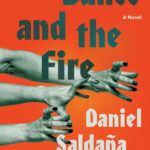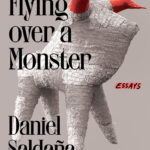Daniel Saldaña París
Subscribe to our newsletter for news & events from Catapult.
Books
The Dance and the Fire
A Novel
In a gripping, atmospheric new novel by acclaimed Mexican writer Daniel Saldaña París, three friends forever bound by erotic flames of the past reunite in a city engulfed by wildfires and an ecstatic dancing plagueAfter years apart, three high school friends return to Cuernavaca, Mexico, where an intense love triangle once left an indelible mark on their adolescence. The city, surrounded by a ring of claustrophobic wildfires, brings out the past and confronts them with their present: they must once again face the entanglement of friendship and desire, the seemingly distant discovery of sexuality, complex parental relationships, and the daunting task of artistic fulfillment.
In the background, two forces of chaos and destruction are a constant presence. As fires ravage the physical landscape, one of the friends begins choreographing an ecstatic dance inspired by the German expressionist Mary Wigman and medieval Danse Macabre. What starts as a coping mechanism for the anxieties of youth and climate catastrophe becomes an overpowering, all-consuming hysteria. Mysterious powers are awakened, the boundary between reality and myth begins to blur, and the friends find themselves immersed in an increasingly turbulent and uncertain universe.
Planes Flying over a Monster
Essays
Finalist for the PEN Translation PrizeFrom one of Mexico’s most exciting young writers, a cosmopolitan and candid essay collection exploring life in cities across the world and reflecting on the transformative importance of literature in understanding ourselves
In ten intimate essays, Daniel Saldaña París explores the cities he has lived in, each one home to a new iteration of himself. In Mexico City he’s a young poet eager to prove himself. In Montreal—an opioid addict desperate for relief. In Madrid—a lonely student seeking pleasure in grotesque extremes. These now diverging, now coalescing selves raise questions: Where can we find authenticity? How do we construct the stories that define us? What if our formative memories are closer to fiction than truth?
Saldaña París turns to literature and film, poetry and philosophy for answers. The result is a hybrid of memoir and criticism, "a sensory work, full of soundscapes, filth, planes, closed spaces, open vastness" (El País).
Catapult | Counterpoint | Soft Skull | Hawthorne Books
20 Jay Street #704
Brooklyn, NY 11201
646.926.0805 | contact@catapult.co
20 Jay Street #704
Brooklyn, NY 11201
646.926.0805 | contact@catapult.co






